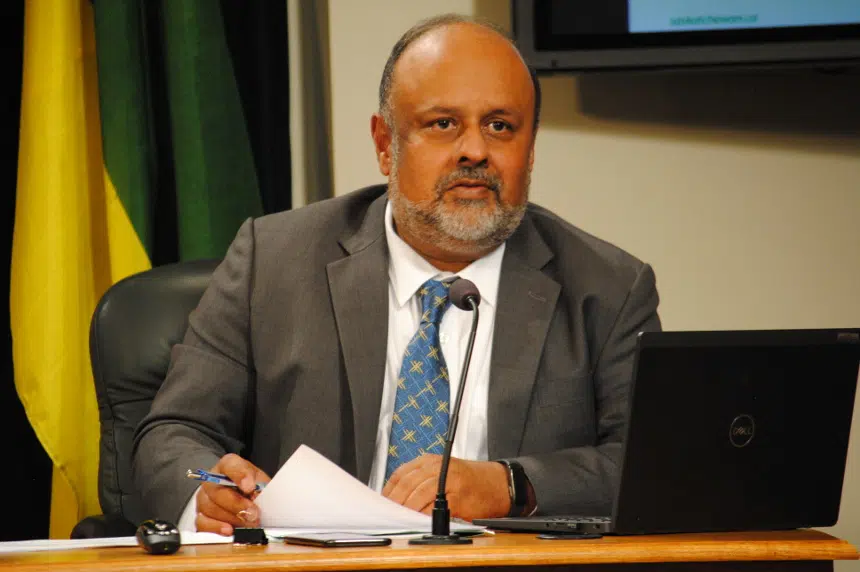After nine straight days of new COVID cases exceeding over 100 per day, Saskatchewan’s chief medical officer Dr. Saqib Shahab says that indoor mask use as well as limiting non-essential services to people who are unvaccinated might be the most effective measures in order to limit the spread of new cases.
Shahab made an exclusive appearance on the Gormley show on Friday morning.
He gave some insight on what his professional recommendations would look like.
“Consistent mask use in indoor public places and, for a limited period of time, limiting access to non essential spaces to unvaccinated people only can reduce the surge,” Shahab said. “I think that’s what the evidence is showing.”
Shahab says these two recommendations could be imperative in preventing the need for future closures of businesses, or requiring the need to reimpose other restrictions.
“We don’t have to have the harsh limitations we had, for example, over Christmas, or Easter where you couldn’t even meet with another household,” he said. “I think we can avoid a lot of that.
“But these are the two policy options that I think we need to put in place for the next six to 12 weeks to get over this fourth surge.”
Shahab went on to say that while he understands limiting non-essential services to people who are unvaccinated could be deemed as unfair, it is something that could be deemed as necessary.
“Otherwise, I think we will have this impact on the workforce because there’ll be a lot of people either sick or looking after children who are unwell and have to stay home,” he said. “Although hospitalisation rates are in middle aged, young adults, we have seen it with the U.S. (United States), which has two to three times our hospital and ICU capacity, that counties and states with vaccination rates maybe slightly lower than ours have been overrun and overwhelmed very quickly.
“I think we just need to be cautious again, unfortunately. We’ve done so well so far and I think we just need to be cautious again for a bit otherwise it may end up with more pain and suffering than we need right now.”
Premier Scott Moe made an appearance on Gormley on Thursday.
Moe said that there were no plans on discussing the reintroduction of any public health measures or vaccine mandates throughout the province.
Adding that he wants to leave the decision of mandatory vaccines up to employers, venues or businesses, the only place Moe said the provincial government is willing to wade into the argument is for provincial employees working in long term care facilities.
“That is not the government’s role to line people up and say that you are going to take this needle if you’re going to live in this society,” Moe said. “It’s not the government’s place to force people to be vaccinated.
“With respect to bringing in public health measures, the government has spent an awful lot of time behind the front door of people’s homes, all governments over the course of the past two years, we should be very apprehensive about going back there.”
Shahab believes there needs to be “difficult” conversations when it comes to the government supporting the framework for certain vaccination requirements for business.
“I do think governments also have a role to support that framework, or enable that framework, because I think otherwise, it’s up to each business. And it may not be a level playing field,” Shahab said. “Especially in areas where the customers may be half and half for vaccinated versus unvaccinated. I think it’s an important discussion and a difficult discussion.
“We have to remember that if you remain unvaccinated, you don’t only just endanger your own health. And we see that with young people ending up in hospitals and the regret they have, especially adults with young children. But also, the fact that it does put others at risk, even those who are fully vaccinated to a much lesser extent, but still some risk, nevertheless.”
Shahab went on to call a reintroduction of COVID measures a “complex” process that would have to have a lot of things sorted out at the government level if there was to be new policies imposed.
“It doesn’t have to be as harsh as things were before. I think we have lots of things to celebrate, but I think we absolutely need to reduce the surge,” he said. “Otherwise, I think that impacts health care, there’s a lot of people needing urgent hospitalizations, which are preventable through vaccinations, then again, starts delaying other elective procedures, other urgent care as well.”
Right now in Saskatchewan, there is no penalty for people choosing not to isolate after a positive COVID-19 test, people are only encouraged to do so.
Meanwhile Manitoba said this week they will reintroduce mandatory masking requirements in indoor public spaces like grocery stores, while B.C announced a policy requiring people to show proof of vaccination to access some non-essential services.







